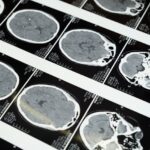- Home
- alcohol rehab
- Wet Brain from Alcohol: Signs & Symptoms of Wernicke-Korsakoff Syndrome
Wet Brain from Alcohol: Signs & Symptoms of Wernicke-Korsakoff Syndrome
The term ‘wet brain’ is a colloquial term coined for those suffering from substantial alcohol abuse. It is usually used to describe patients who are suffering from Wernicke-Korsekoff syndrome.
According to the National Organisation for Rare Disorders, around one to two per cent of the population suffers from this disease. [1]
Alcoholism and the Brain

Alcohol is so accessible in today’s society that many forget how devastating the consequences can be if it is not used in a responsible manner. Alcoholism does not just pertain to those who drink excessively every day but includes binge drinking, heavy drinking, use of alcohol during pregnancy and underage drinking.
Alcohol usage over time will cause your brain to deteriorate, meaning some symptoms may appear even in sobriety. Many of those who struggle with alcoholism have deficiencies in vitamins and vital nutrients within their body.
Researchers have discovered that the brain can shrink due to excessive alcohol usage. It has been stated that chronic abusers of alcohol have smaller and lighter brains than non-drinkers; neurotransmitters are also shown to be damaged in those who abuse alcohol.
Alcoholism and the Body
It seems to be common knowledge that alcohol isn’t fantastic for your body in the long term. This means that those who suffer from alcohol addiction can cause extensive and devastating damage to their bodies.
Over time, excessively drinking alcohol can dramatically increase the likelihood of you developing serious chronic diseases like heart disease, liver disease, cancer, high blood pressure and stroke.
A report showed that up to 80 per cent of alcoholics have a deficiency in thiamine, also known as vitamin B1. Thiamine is usually supplemented to the body via a balanced, healthy diet, which many who struggle with alcoholism find hard to maintain. [2]
Thiamine Deficiency Concerning Alcohol Abuse
Thiamine, also known as thiamin or Vitamin B1, is a crucial nutrient to the body that helps turn the food you eat into energy, keeping the nervous system healthy.
The human body cannot create this vitamin but gains it from a healthy balanced diet. Foods rich in thiamine include meat, poultry, nuts, whole grain cereals, and dried beans. Some processed foods are enriched with thiamine that has been added.
Particularly high concentrations of thiamine are often found in the skeletal muscles and the heart, liver, kidney, and brain, however, in the tissues of the body, thiamine is required to assist with metabolism and proper functioning.
A thiamine deficiency does not just pertain to those who excessively abuse alcohol, but also to those who are malnourished. Nevertheless, in countries like the UK, where malnutrition is uncommon, thiamine deficiency is usually attributed to those who excessively abuse alcohol.
A thiamine deficiency can be felt in all organs within the body, however, it is the heart and central nervous system that feel the strain the most from a thiamine deficiency. This deficiency has an established link to those who abuse alcohol, specifically Wernicke-Korsekoff syndrome.
However it also significantly contributes to other forms of alcohol-induced brain injuries like alcohol-induced persisting dementia. [3]
What is Wernicke-Korsakoff Syndrome?

Depressed man covering his face red filter effect
Wernicke-Korsakoff syndrome (WKS) can be casually referred to as ‘wet brain’ and refers to a disease characterised by two separate syndromes. The former is Wernicke’s encephalopathy the latter Korsakoff’s psychosis.
WKS is a brain disorder closely related to the phases of a thiamine or vitamin B1 deficiency. When caught early, the disease can be reversed however left untreated, the patient can experience devastating irreversible symptoms. [4]
Wernicke’s Encephalopathy
Wernicke’s encephalopathy is an acute neurological condition characterised by symptoms including confusion, loss of muscular coordination, abnormal eye movement, and vision changes. Caused primarily by a thiamine deficiency, Wernicke’s encephalopathy is a life-threatening illness if untreated.
Examples of patients with Wernicke’s encephalopathy may be extremely confused about their surroundings or even struggle to walk alongside unpredictable eye movements. This however doesn’t have to be present in extremes for a doctor to diagnose the syndrome.
Korsakoff’s Psychosis
Reports state that approximately 80 to 90 per cent of those diagnosed with Wernicke’s encephalopathy also develop Korsakoff’s psychosis, a chronic and debilitating syndrome. [3]
Patients with this condition struggle with memory and coordination and are quick to become frustrated. It isn’t just that they struggle to remember old information but they also struggle to take on new information.
Korsakoff syndrome is most commonly associated with alcohol abuse but can also be common among AIDS, cancers that have spread along the whole body, chronic infections and poor nutrition. It has also been located in patients who cannot absorb food properly; like those with a chronic illness or patients after bariatric weight-loss surgery. [6]
“The disease can begin over a period of weeks. Ocular muscles become weak or paralyzed. The sense of balance is affected, sometimes so badly that it is impossible to walk. Amnesia and general confusion take over. Finally, the victim may lapse into a coma and die.” – The New York Times, 1979 [7]
Symptoms of Wernicke-Korsakoff Syndrome
The term ‘wet brain’ was coined in reference to a patient usually consuming excessive amounts of alcohol, filling their skull and making their brain wet.
Symptoms of WKS can be separated however follow a lot of similarities. Both the one suffering and those around them may be able to spot signs that they are developing this chronic disease.
Symptoms of Wernicke encephalopathy include:
- Confusion and loss of brain activity may result in a coma or death
- Severe alcohol withdrawal symptoms
- Loss of muscle coordination severe tremors (ataxia)
- Vision changes and abnormal eye movements, double vision or drooping eyelids
Symptoms of Korsakoff’s psychosis
- Inability to form new memories
- Making up stories (confabulation)
- Hallucinations
- Severe loss of memories [5]
Cerebellar Degeneration

The cerebellum is part of the brain that sits at the base of your head, next to the brain stem. Primarily used for motor function, the cerebellum helps with balance, coordination and smooth vision.
Surprisingly, though it only makes up around 10% of your brain, it holds around half of the neurones for your body to function.
It is common among those suffering from WKS to experience cerebellar degeneration, which usually develops following a decade or more of heavy drinking. Autopsies have shown that 40% of alcoholics showed signs of cerebellum atrophy(shrinkage).
Those experiencing cerebellar atrophy will have found difficulty in movement coordination and eye movements. It is believed that it is thiamine deficiency that is the predominant cause of cerebellar degeneration.
Treatment for Wernicke-Korsekoff Syndrome

Treatment for Wernicke-Korsekoff syndrome does not have the goal of curing the disease. However, instead, it has the goal of controlling symptoms and preventing the worsening of the symptoms. [5]
Special care may be needed; a rehabilitation facility or hospital may be able to treat you or your loved one through a vitamin B1 (thiamine) injection into a vein or muscle. However, while this may help with acute cases, thiamine does not improve loss of memory through Korsakoff syndrome.
Early intervention can be crucial on the road to recovery. Korsakoff syndrome can lead to other health concerns like liver disease and cirrhosis as the disease can lessen your loved one’s tolerance to alcohol, meaning they continue to drink more, but their body cannot process it as fast.
Only stopping alcohol consumption will prevent continued loss of brain function and ongoing damage to nerves. Attending a drug and alcohol rehab will break the cycle of addiction and give the support and care you or your loved one will require as they begin to navigate recovery.
Can ‘wet brain’ be reversed?
Most symptoms of Wernicke’s encephalopathy can be reversed if treated in due course, alongside relinquishing the use of alcohol. Nevertheless, improvement is usually slow and can be incomplete. Without treatment, these symptoms can begin to worsen, becoming disabling and fatal. [6]
Scientists have confirmed that they are unsure of the statistics surrounding Wernicke-Korsekoff syndrome. Those in the field believe it is less common than Alzheimer’s or dementia. Nevertheless, they confess Wernicke-Korsekoff syndrome may be underdiagnosed.
If left untreated, Wernicke-Korsekoff syndrome can be fatal in approximately 20% of cases.
However, upon beginning treatment and ceasing alcohol usage alongside thiamine injections, you may begin to see or feel improvements within a few days, however mental confusion and memory may take a few months to show improvement.
Data shows that around 25% of patients who receive treatment for Korsakoff syndrome recover fully, about half improve but never fully recover from the symptoms and 25% remain unchanged.
Some research also proposes that those who recover and continue to abstain from alcohol can go on to live a normal life expectancy. [8]
Do I have Wet Brain?

It can be challenging for those who suffer from alcohol addiction to acknowledge their situation. However, if you believe your drinking has gotten out of control and you may be at risk of developing this chronic disease, there are signs you can look out for.
Early signs of wet brain include:
- Constant vomiting
- Difficulty concentrating
- Anaemia or other nutritional deficiencies
- Giddiness (for no apparent reason)
- Poor diet, high in carbohydrates that are not whole grains
- Fatigue
- Rapid weight loss
- Loss of appetite
- Insomnia
- Memory loss
Nevertheless, the best way to discover if you have Wernicke-Korsekoff syndrome is to visit your local GP and be candid about your alcohol usage. Your doctor will be able to properly diagnose you and assist you in your treatment.
You may also consider entering a rehabilitation clinic, where you can receive help to break the cycle of alcoholism, learn new coping skills, and begin understanding the root of your addiction.
Getting Help for Alcoholism
Alcoholism has an unfortunate prevalence in today’s society. However, help is available to those who need it, with many who suffer from addiction going on to live long, healthy lives.
Although the funding has been dramatically cut for drug and alcohol services, these establishments still stand and can provide sensational care for those who need it.
Self-help-support groups like Alcoholics Anonymous have helped millions worldwide achieve and maintain sobriety through their 12-step process.
References
[2] https://pubs.niaaa.nih.gov/publications/aa63/aa63.htm
[4] americanaddictioncenters.org
[7] https://www.nytimes.com/1979/02/12/archives/put-thiamine-in-liquor.html
[8] alz.org




